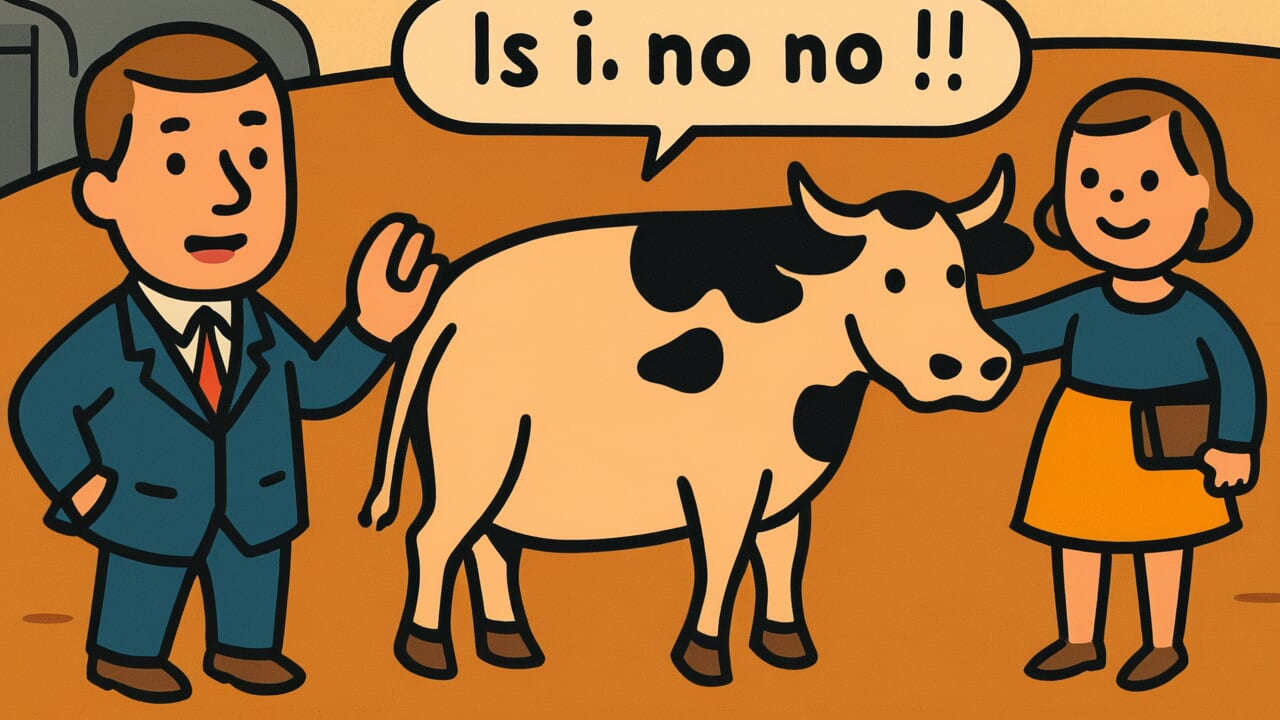How to Read “A cow’s piss and a parent’s advice don’t work even if they’re long”
Ushi no shōben to oya no iken wa nagakute mo kikanu
Meaning of “A cow’s piss and a parent’s advice don’t work even if they’re long”
This proverb means that long lectures and advice don’t reach the listener’s heart, even if the content is correct.
Parents often give advice to their children out of love. These words are usually valuable and well-intentioned.
However, when advice goes on too long, the listener loses focus. The content stops entering their mind.
Human attention has limits. No matter how correct something is, people get bored if it goes on forever.
This proverb applies beyond parent-child relationships. It fits boss-employee, teacher-student, and many other situations.
You might have many things to say because you care. But trying to cram everything into one session means nothing gets through.
Even today, long speeches at meetings and repetitive warnings are avoided. This proves the truth this proverb teaches.
Origin and Etymology
No clear written records exist about this proverb’s origin. It likely spread among common people during the Edo period.
Let’s look at the expression “cow’s piss.” Cows have large bodies and produce large amounts of urine. The process takes a long time.
Japan was an agricultural society. Cows were familiar livestock deeply connected to people’s daily lives.
People who cared for cattle saw this process regularly. They thought about comparing this long, drawn-out sight to something else.
“Parent’s advice” refers to warnings and lectures given from parental concern. Parents worry about their children’s future and tend to talk too long.
But overly long lectures make listeners lose concentration. The words stop touching their hearts.
Combining these two creates a shared theme of “length.” Both also share the ironic truth of being “ineffective.”
The proverb pairs something noble—parental advice—with something crude—cow’s piss. This creates humor while showing sharp human observation.
It’s an honest and refreshing proverb born from common people’s real-life experiences.
Usage Examples
- The boss started another long lecture, but “A cow’s piss and a parent’s advice don’t work even if they’re long” is really true
- It’s good advice, but if you talk for an hour, “A cow’s piss and a parent’s advice don’t work even if they’re long”
Universal Wisdom
This proverb has been passed down for generations because it points out a fundamental contradiction in human communication.
When we care about someone, we want to say many things. The more we care, the more we want to share.
Parents talk at length to their children because of deep love. But here lies a fundamental human dilemma.
The stronger our desire to communicate, the more words we use. And the more words we use, the harder they are to receive.
Human concentration and memory have limits. This biological fact doesn’t change across time or culture.
No matter how important the content, our brains can’t process long streams of information. When receiving long lectures, our defense instincts activate.
The feeling “here we go again” arises. Our mental shutters come down.
This proverb teaches that good intentions don’t always equal effectiveness. It shows the difficulty of human relationships.
Because we care deeply, we need wisdom to communicate briefly and accurately. Our ancestors understood this subtle human psychology.
They passed it down with humor. This isn’t mere criticism but deep insight into better communication.
When AI Hears This
Claude Shannon, founder of information theory, showed that noise always enters information flowing through communication channels over time.
The longer parental advice becomes, the lower the density of essential messages actually gets. For example, in a three-minute lecture, truly important information concentrates in the first 30 seconds.
The remaining two and a half minutes tend to be repetition and supplementary explanation. The “novelty” per unit of information drops sharply.
More interesting is the brain’s cognitive filtering mechanism. The brain receives about 11 million bits of sensory information per second.
But it can consciously process only about 40 bits. So the brain automatically cuts “information not directly linked to survival.”
Long parental advice gets judged as low-urgency information by the brain. People seem to be listening but are actually rejecting reception.
The brilliance of the cow’s piss metaphor lies exactly here. Something that pours out continuously but gets absorbed into the ground without leaving traces perfectly represents information transmitted in large amounts but not retained in the receiver’s memory.
Longer advice lowers information density while simultaneously activating the brain’s defense mechanisms. Our ancestors grasped this dual mechanism through intuition alone, without scientific analysis.
Their observational skills are truly remarkable.
Lessons for Today
This proverb teaches modern people that “strength of feeling” and “power to communicate” are separate things.
When you want to tell someone something, the more correct your content, the more passionate you might become. You might talk at length.
But stop and think. Is the other person really listening? Their eyes might meet yours, but their mind might already be elsewhere.
What matters is the courage to cut words. If you have ten things to say, narrow them down to the three that truly matter.
Then communicate briefly and memorably. This doesn’t disrespect the other person. It actually shows respect for their time and heart.
Today, SNS and messaging apps make short exchanges mainstream. This isn’t shallow communication.
It’s also a training ground for conveying essence within limited characters.
Value your words. And to make them reach the other person’s heart, polish quality, not quantity.
Brevity is a form of consideration for others.



Comments